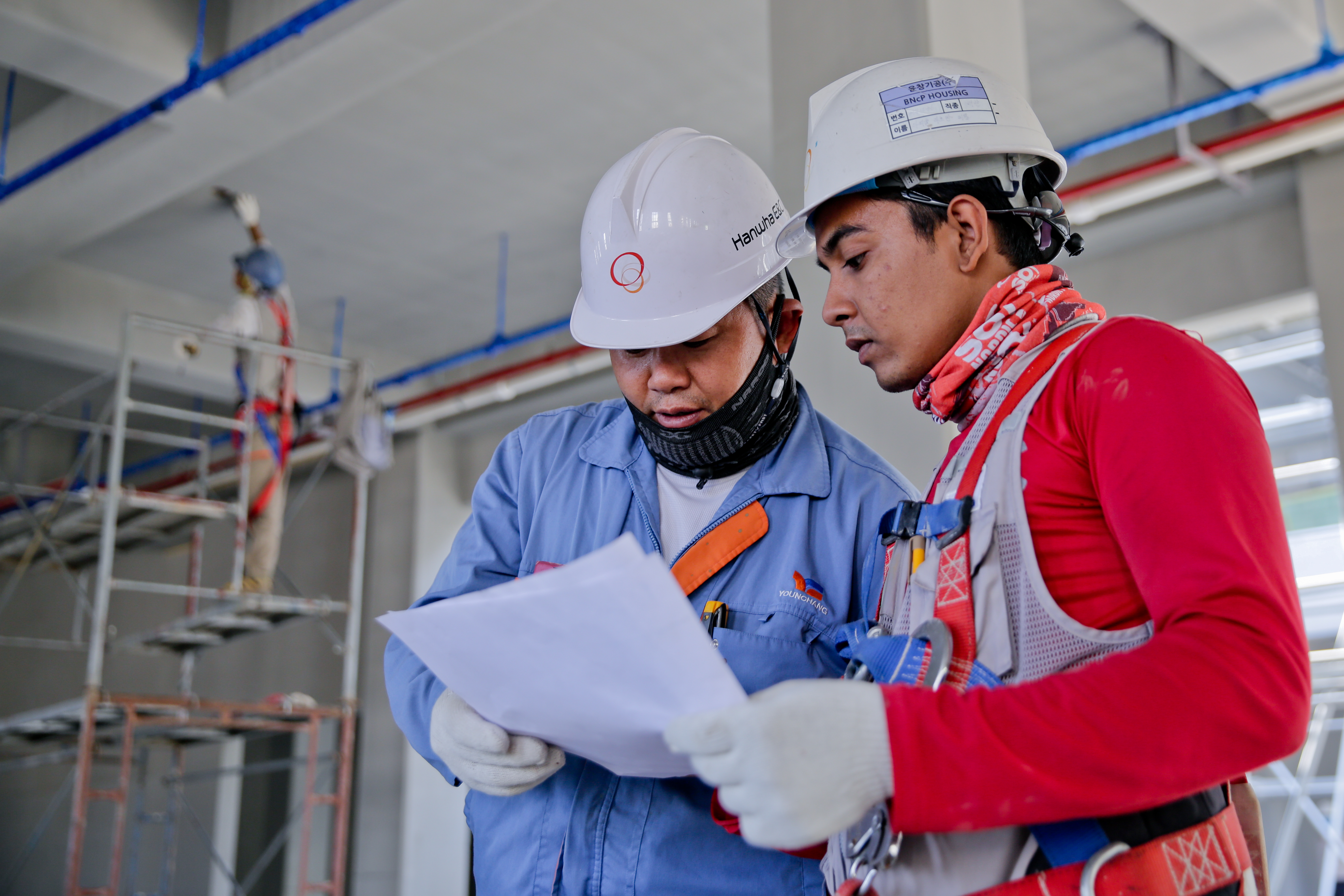Did you know? According to the Bureau of Labor Statistics, construction projects with strong project management are 40% more likely to be completed on time and within budget. Yet, few people truly appreciate the depth of responsibility that the role of a construction project manager carries. In this comprehensive guide, you'll discover how understanding the role of a construction project manager can transform not only building sites but also entire business outcomes—whether you're a stakeholder, aspiring manager, or team member.Introduction: The Importance of Understanding the Role of a Construction Project ManagerSuccessful construction projects don't happen by accident—they are the result of expert leadership, meticulous planning, and seamless collaboration. At the heart of every successful project lies the construction project manager, who orchestrates the entire operation from start to finish. Understanding the role of a construction project manager goes beyond knowing job titles: it means seeing how this pivotal position integrates vision and action, guiding crews through complexities, overcoming challenges, and ensuring every milestone is met. Today, as the construction industry grows more complex, understanding this role is no longer optional—it's essential. A Startling Statistic: The Impact of Successful Construction Project Managers on Industry OutcomesThe construction sector is notorious for delays and budget overruns, but projects led by experienced project managers consistently outperform—achieving 70% higher satisfaction scores from clients. This statistic from the latest industry report demonstrates that a skilled construction project manager doesn't just prevent costly mistakes; they create real value. These professionals apply advanced risk management, optimize project schedules, and elevate safety and quality standards on every job. By understanding their true impact, organizations and future managers can harness strategies proven to drive remarkable project success.What You'll Learn About Understanding the Role of a Construction Project ManagerWhat a construction project manager doesKey skills and experience needed for construction managersThe typical workflow and responsibilities on a construction siteHow project management practices shape construction project outcomesDefining Understanding the Role of a Construction Project ManagerWho Is a Construction Project Manager?A construction project manager is the linchpin of complex building projects, blending technical know-how with people skills to bring plans to life. They steer projects from pre-construction through completion, making hundreds of decisions that affect cost, schedule, safety, and quality. Unlike other managers who may only oversee a narrow part of the process, construction project managers are responsible for the entire project lifecycle—including initial planning, day-to-day operations, and final delivery. Their work is hands-on, often requiring them to move between the construction site, contractor meetings, and stakeholder presentations. To be effective, a construction project manager needs to not only understand blueprints and technical data but also lead teams, communicate with a variety of personalities, and solve challenges in real time. Their expertise ensures that complex construction projects—whether a new office building or a highway expansion—are safely completed on schedule, within budget, and to the highest quality standards.The Connection between Project Management and Construction ProjectsProject management serves as the backbone for every successful construction project. Unlike projects in other industries, construction work unfolds in a dynamic and high-stakes environment—unpredictable weather, last-minute design changes, and safety hazards are just a few obstacles that can arise. A construction project manager applies the principles of project management to these unique challenges, using specialized methods to create detailed project plans, maintain project schedules, and ensure teams work safely and efficiently on the construction site. Their efforts are essential not only for completing tasks but for aligning project goals with client expectations and regulatory requirements.By bridging the gap between vision and execution, construction managers play a pivotal role in translating architectural drawings and construction plans into tangible structures, making them indispensable to the construction industry and the broader field of project management.Key Responsibilities in Understanding the Role of a Construction Project ManagerProject Planning: Crafting and Managing the Project PlanAt the core of any project manager's work lies the creation of a robust project plan. This document serves as the map for the entire project, outlining timelines, deliverables, resource allocation, and critical milestones. A skilled construction project manager takes this foundational plan and customizes it to the unique needs of each project, frequently collaborating with stakeholders, architects, and engineers to ensure every aspect aligns with broader goals and client expectations. Beyond initial planning, these managers continuously refine the project plan throughout the construction process. They use digital scheduling tools, collaborative platforms, and site meetings to identify emerging risks or opportunities for efficiency. By maintaining an actionable and adaptive project plan, the construction manager lays the groundwork for tasks to be completed on time and on budget—delivering a successful project every time.Project Scheduling and Budget ControlOne of the most demanding roles for a construction project manager is balancing the project schedule and budget control. Construction projects involve multiple teams, contractors, and ever-shifting timelines, requiring managers to monitor progress daily and adjust resources as needed. They not only draft initial schedules based on project scope but also track every phase, update timelines in the face of delays, and keep all parties informed.Cost overruns are a top concern in the construction industry, so proactive budget monitoring is a constant priority. Project managers analyze expenses, manage accounts payable, negotiate with vendors, and approve change orders only when absolutely necessary. By integrating financial controls with scheduling technology, they protect the project's profitability while maintaining the momentum needed to deliver results.Risk Management in Construction ProjectsRisk management is another cornerstone for successful construction project managers. The dynamic environment of a construction site presents numerous hazards—from equipment failure and weather disruptions to material shortages and regulatory shifts. Project managers proactively identify risks during planning, assigning responsibilities for mitigation and ensuring all safety protocols are enforced on-site. By cultivating a culture of safety and risk awareness, construction managers play a decisive part in reducing workplace accidents and costly project stoppages. Regularly updated risk management plans help project managers stay ahead of potential issues and keep the team focused on delivering quality results, even under pressure.Oversight on the Construction Site and Coordination with General ContractorThe construction project manager must have a strong presence on the construction site—overseeing daily activities and ensuring the general contractor and subcontractors remain aligned with project objectives. This hands-on oversight guarantees that quality standards, safety policies, and communication channels are upheld throughout the build. Effective coordination with the general contractor is crucial for timely problem-solving, resource allocation, and harmonizing changes between different disciplines. By proactively resolving issues, authorizing site directives, and adapting to field conditions, the construction manager safeguards both the budget and timeline. Their daily engagement prevents minor complications from becoming major causes of project delay or added cost.Monitoring Progress: Project Managers and Stakeholder CommunicationConsistent monitoring and clear communication form the backbone of effective construction project management. Project managers deploy progress-tracking tools, such as Gantt charts and dashboards, to provide real-time status updates. They deliver regular reports to stakeholders—owners, architects, financiers—and facilitate meetings to keep everyone informed and invested in project outcomes.By addressing concerns quickly and transparently, construction project managers ensure confidence among stakeholders and the project team. This active engagement mitigates misunderstandings, aligns team efforts with project objectives, and ensures the construction project is delivered as promised.Essential Skills and Work Experience for Modern Construction Project ManagersTechnical Knowledge and Work Experience in the Construction IndustrySuccessful construction project managers combine foundational industry knowledge with years of work experience on construction sites. They understand construction methods, materials, and site logistics, and can interpret complex plans and technical specifications. Many hold a degree in construction or a related field, often supplemented with additional training in project management or construction management. Prior experience—such as working as an assistant project manager, foreman, or estimator—provides the real-world skills necessary for effective leadership. These managers harness their expertise to anticipate project needs, guide troubleshooting, and maintain high standards of quality from beginning to end.Leadership, Communication, and Negotiation SkillsOn top of technical acumen, top construction project managers are exceptional leaders and communicators. They inspire teams, resolve conflicts, and negotiate contracts with general contractors and suppliers. Their role demands clarity, assertiveness, and the ability to persuade diverse groups toward a common objective. Skilled managers adjust their communication style for each audience, building trust between crew members on the construction site and maintaining professional relationships with clients and executives. Their negotiation skills enable them to secure resources at fair prices and resolve disputes before they escalate, keeping the project on track.Problem Solving and Adaptability for Construction Project ManagersThe environment of a construction site is ever-changing, so adaptability and problem-solving are essential for successful project management. Construction project managers must remain calm in crises, develop creative solutions to obstacles, and recalibrate the project plan as circumstances demand.They draw on their work experience and technical knowledge to make rapid decisions—sometimes under severe pressure—balancing competing priorities to keep the project moving forward. Adaptability ensures they can overcome weather disruptions, staff shortages, supply chain issues, and new regulations without compromising overall project quality or client satisfaction.Processes in Construction Project Management: From Idea to CompletionEstablishing the Project Plan: Scope, Budget, and TimelineEvery construction project begins with a detailed project plan. The project manager defines the project scope, coordinates budget estimates, and creates a realistic timeline for deliverables. They connect with architects, engineers, clients, and the general contractor to ensure consensus on every element before construction begins. Effective project managers use digital planning tools to simulate schedules and resources, identifying risks before they become costly problems. Throughout the project, they update the plan as conditions change or new requirements emerge, maintaining alignment with all stakeholders. This proactive approach is vital for keeping the entire project organized and moving toward successful completion.Managing Subcontractors and the Role of Construction ManagersA construction project manager must be adept at coordinating a diverse group of subcontractors, each responsible for specialized facets of construction—plumbing, electrical, structural, finishes, and more. By building strong relationships with each subcontractor and maintaining open lines of communication, the manager ensures all parts of the project come together efficiently and without conflict.Construction managers also verify that subcontractors adhere to safety protocols, quality standards, and schedule requirements. Close oversight helps minimize errors or rework, making a major difference in project outcomes.Final Delivery: Ensuring Project Management SuccessDelivering a successful project means more than completing construction. The manager is responsible for final inspections, quality assurance, and handover to the client. This stage includes walk-throughs, punch lists, documentation, and resolving any outstanding issues—securing client approval and building trust for future opportunities.Ultimately, the ability of a construction project manager to align all moving parts and meet or exceed project goals is what distinguishes professionals who are leaders in the field.A Day in the Life of a Construction Project ManagerHow Construction Project Management Differs from Other Project Management FieldsKey Differences in Construction Projects and Construction Industry NeedsWhile core project management principles apply across industries, the construction industry presents a unique set of challenges and requirements. Unlike software or business projects, construction projects take place in dynamic, physical environments—subject to weather, site limitations, regulatory oversight, and significant safety concerns. Construction project managers must possess specialized knowledge about building processes, materials, codes, and safety requirements, blending field experience with technical skills.The consequences of delay or miscommunication are high, so precision in scheduling and stakeholder management are an absolute priority. These demands shape the distinct profile of the construction manager versus managers in IT or finance.Applications of Specialized Construction Management SkillsSpecialized expertise in construction project management enables managers to solve complex logistical challenges—such as orchestrating deliveries just in time for installation, sequencing trades for optimal efficiency, and anticipating regulatory changes that could affect progress. These skills help mitigate the risk of costly delays and ensure that projects are completed on time and to specification.By applying their industry-specific skills within a broader project management framework, construction professionals deliver high-value outcomes and distinguished success in the construction profession.Competency/ResponsibilityConstruction Project ManagerGeneral Project ManagerTechnical KnowledgeExpertise in construction methods, building codes, safety regulations, and site logisticsGeneral process knowledge, may not require industry-specific expertiseWork EnvironmentActive construction sites, physical resources, varying weather and site hazardsOffice settings, remote management, virtual or digital deliverablesStakeholder CoordinationClients, architects, engineers, contractors, regulatory bodiesBusiness clients, department heads, vendors, project teamsProject Schedule & BudgetReal-time site management, scheduling trades, managing change ordersResource allocation, timeline tracking, financial reportingRisk ManagementPhysical risks (safety, weather), regulatory complianceOperational, reputational, or financial risksEnd DeliverablePhysical structure—building, renovation, or infrastructure projectProduct, system, service, or campaign rollout Benefits of Effective Construction Project ManagementOn-time and on-budget completionImproved safety and risk managementEnhanced communication with clients and stakeholdersQuality assurance throughout the construction processCommon Challenges in Understanding the Role of a Construction Project ManagerManaging Complex Project SchedulesKeeping a construction project completed on time requires synchronizing a complex web of activities and teams. Project managers often juggle dozens of concurrent tasks, ensuring each is sequenced correctly and dependencies are managed. They use project management software to create visual project schedules (such as Gantt charts), which allow for quick adjustments when unforeseen changes arise. Continuous coordination between subcontractors, deliveries, inspections, and client needs keeps the process moving efficiently—even when schedules shift. Good managers work to forecast risks and delays, allocating resources ahead of time and communicating changes early. This proactivity differentiates average project managers from industry leaders.Navigating Client Expectations and Construction Site VariablesClients may have ambitious expectations regarding cost, timeline, or design changes, while the realities of the construction site present physical and logistical constraints. Construction project managers act as liaisons, balancing the client’s goals with the feasible execution on the ground. They clarify expectations early, mitigate misunderstandings, and navigate shifting site conditions—from weather disruptions to unexpected site discoveries—while defending the quality and integrity of the project.This adaptive, diplomatic approach is essential for achieving high customer satisfaction and successful project outcomes amid change.Handling Crisis: Case Examples from Construction ManagersMajor disruptions are inevitable, but how project managers respond determines the impact. For example, when a critical delivery goes missing or a sudden storm halts site work, a project manager must quickly assess the situation—reroute resources, reschedule activities, and communicate emergent risks. Their hands-on management, adaptability, and relationship with stakeholders can turn potential failures into wins for everyone involved.“A construction project manager’s real success is measured by their ability to foresee obstacles and still deliver results.”Career Pathways: How to Become a Construction Project ManagerEducation, Certification, and Work Experience RequiredMost construction project managers have a degree in construction, engineering, architecture, or a related field. Many also pursue additional certification or training in construction management or project management—credentials like PMP (Project Management Professional) or a degree in construction management can provide a major competitive edge. Real-world work experience remains indispensable; most professionals start as field engineers, assistants, or in trade roles before stepping into full management.The Bureau of Labor Statistics notes a steady growth in demand for experienced construction managers, emphasizing the value of both education and hands-on project experience.Advancement Opportunities for Project Managers in the Construction IndustryAmbitious managers can progress from overseeing smaller projects to managing multi-million-dollar developments, joining larger construction firms, or moving into executive roles as director of construction or operations. Many develop a specialty—green building, infrastructure, or commercial real estate—or launch their own construction firms. With continual investment in professional development, the career path is both stable and upwardly mobile.People Also Ask About Understanding the Role of a Construction Project ManagerWhat are the duties of a construction project manager?Answer: Construction project managers oversee coordination, budgeting, scheduling, and supervision throughout the construction project. They liaise between clients, contractors, and stakeholders while managing risk, ensuring safety, and delivering project objectives efficiently.What are the 5 key roles as a project manager?Answer: The five key roles are planning, organizing, leading, controlling, and closing. These span project scheduling, supervision, stakeholder communication, resource management, and performance evaluation within the construction industry.Is construction PM a stressful job?Answer: Construction project management is demanding, involving high responsibility for deadlines, budgets, and team dynamics. Stress is common, but skilled managers use project management tools and experience to navigate challenges and maintain project momentum.What's a typical day for a const. PM?Answer: A typical day includes site visits, coordination meetings, updating project plans, managing budgets and schedules, solving site issues, and stakeholder communications. The role is dynamic, requiring multitasking and adaptability.Interview with an Experienced Construction Project Manager: Insider Tips and InsightsLists: Best Practices for Effective Construction Project ManagementStart with a comprehensive project planPrioritize clear and frequent communicationPrepare proactive risk management strategiesTrack progress regularly and adjust schedules as neededDevelop strong relationships with general contractors and subcontractorsFAQs about Understanding the Role of a Construction Project ManagerWhat qualifications make a successful construction project manager?A successful construction project manager typically holds a degree in construction management or a related field, possesses significant work experience on construction sites, and holds certifications like PMP or equivalent. Strong leadership, communication, problem-solving, and a thorough grasp of safety and building codes are vital. Ongoing professional development and a passion for collaboration also set top construction managers apart.How does project management software help construction projects?Project management software provides real-time scheduling, budgeting, resource tracking, and document management, streamlining communication across teams and stakeholders. These tools enable construction project managers to promptly identify delays, optimize workflows, and ensure all phases of the project are coordinated effectively. Software platforms also facilitate documentation and compliance, minimizing costly mistakes and repeated work.What are common pitfalls for new construction managers?New project managers often underestimate the complexity of scheduling, overlook stakeholder communication, or fail to anticipate site challenges. Inadequate risk management and lack of proactive problem-solving can result in missed deadlines or budget overruns. Learning to balance delegation, oversight, and communication quickly is key to building credibility in the construction profession.Are there unique challenges in large-scale construction projects?Yes, large-scale construction projects pose unique challenges, including greater regulatory scrutiny, extensive coordination among multiple sub-contractors, more complex logistics, and larger budget management. Project managers must also handle layered communication and ensure that quality standards are uniformly maintained across vast teams and timelines.Key Takeaways on Understanding the Role of a Construction Project ManagerConstruction project managers are crucial for successful project deliveryExpertise in project management, communication, and industry standards is vitalCareer progression requires continual learning and adaptabilityConclusion: Elevate Your Projects by Understanding the Role of a Construction Project ManagerEmbracing the Full Scope of Construction Project Management for Sustained SuccessTo achieve consistent project results and lasting client satisfaction, understanding the role of a construction project manager is essential—it’s the key to unlocking improved efficiency, quality, and safety in every construction project.Ready to Experience Exceptional Project Outcomes? Call us at 859-444-6680 or visit remodelworxky.com



 Add Row
Add Row  Add
Add 


Write A Comment